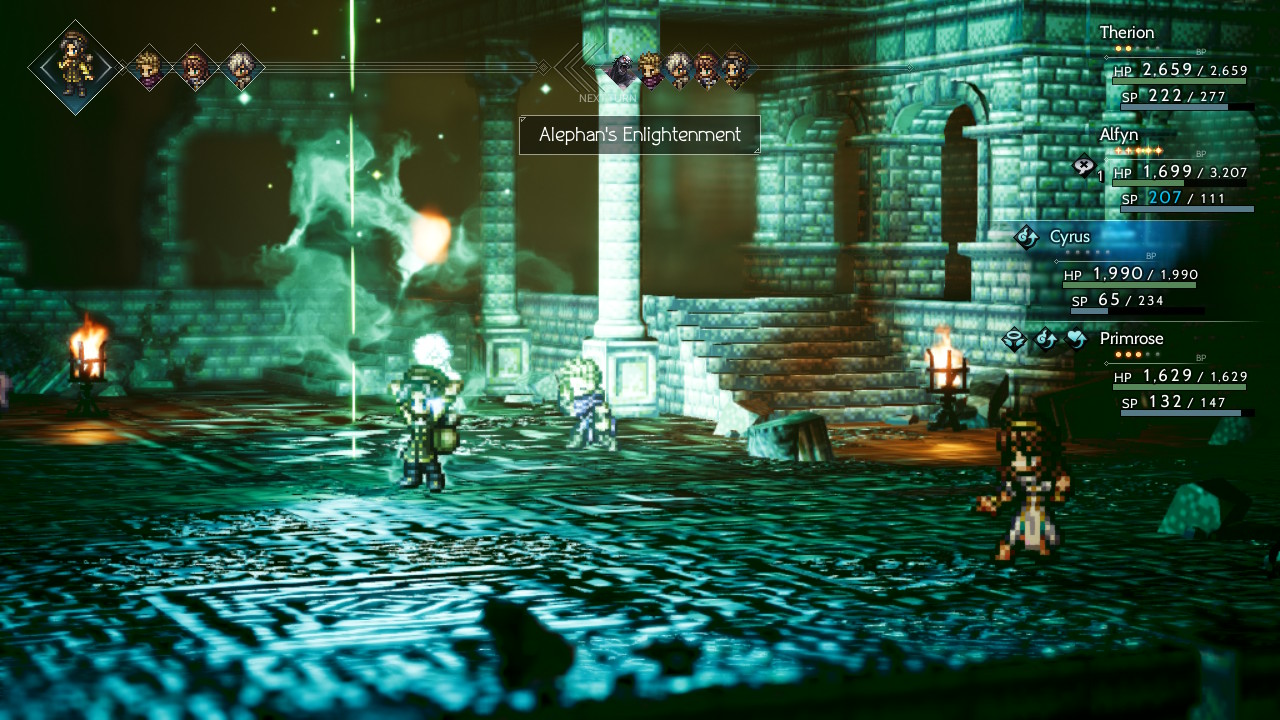 Nintendo's Switch was in desperate need of a roleplaying game, and Square Enix's Octopath Traveler, with its retro pixel-art feel, heeded the call. The unashamedly old-school game draws inspirations from myriad RPGs of the past but centers its story on eight (!) protagonists -- if that's even possible. For anyone that has experienced JRPGs from the glory days of the SNES and the PlayStation, the battle system, level progression and job classes are easy to understand. The story, however, is a messy one. Eight heroes is several heroes too many. 
I've been excited about Octopath Traveler for a while. The team behind it amped up the anticipation for RPG fans by framing it as the spiritual successor to the well-regarded Final Fantasy VI, and while the comparison makes sense in places (ensemble cast, medieval trappings, random battles, cute pixel characters), after 60 hours, the game doesn't have a killer big bad, and I've seen none of the slick set-pieces (Middle-of-the game opera? A team battle with Moogles? Fight a runaway train?) that made FFVI such a hit over 20 years ago. Octopath Traveler's strength lies in its battle system. Stylistically it reminds me a lot of Golden Sun (vintage 2001), with HD-2D areas and turn-based battles filled with pyrotechnics. For others, it'll feel like the SaGa series. There's a boost system familiar to anyone who's played Bravely Default, which adds an extra tactical dimension to battles -- I told you the game pulled inspiration from a lot of places. Once boosted, attacks will light up the battleground, illuminating (and reminding you of) the 3D surroundings. For once, battle dynamics are easy to explain: They center on elemental and weapon weaknesses, and you'll have to combine attacks from your four-person party to break enemies, stalling their movement and increasing the damage you deal to them. Tighten your strategy and perfect battles will be rewarded with extra experience points, skill points and sweet, sweet money. 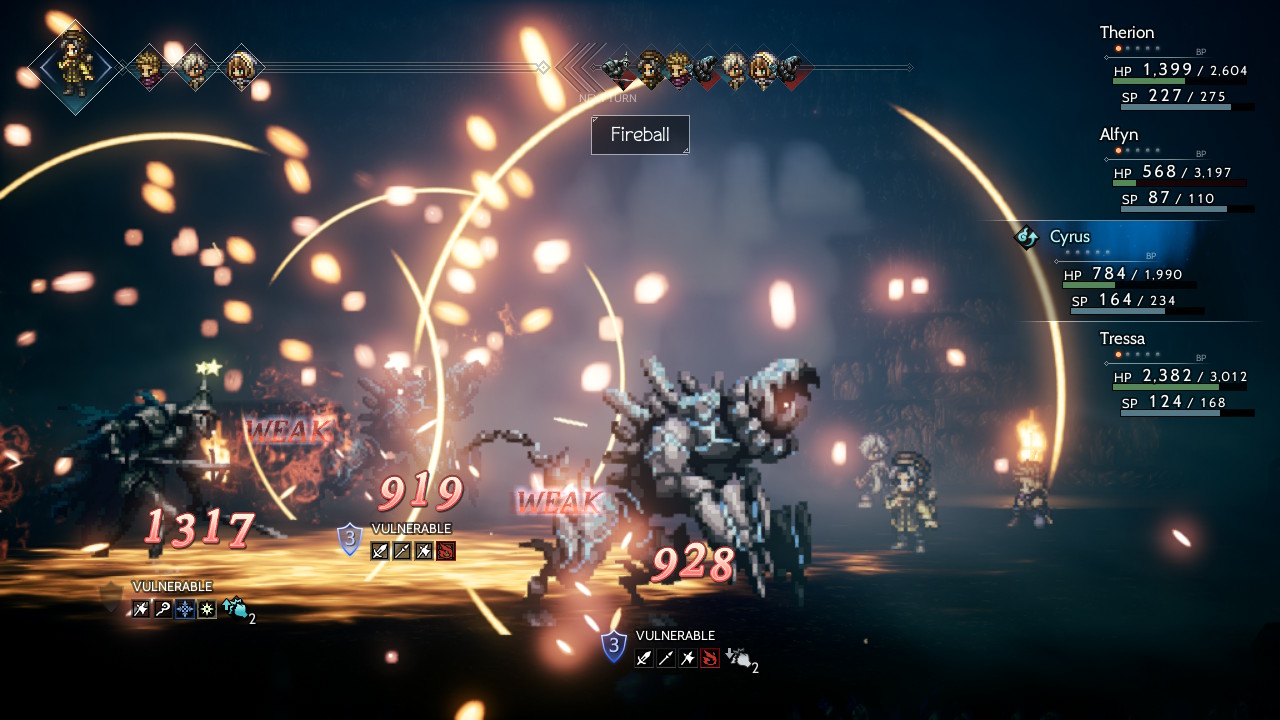
Each member of your team starts off with their own established class: Merchant Tressa, Warrior Olberic, the apothecary Alfyn, the dancer Primrose, Therion the thief, the cleric (white mage) Ophilia, the scholar (read: Black Mage) Cyrus, and the hunter / Pokemon master H'aanit. Loosely, classes can be organized into physical attack (warrior, hunter, thief), support (apothecary, dancer) and magic attack (scholar, cleric), but there's some overlap. Therion, with his thief class, still has a single-target fire attack, while the apothecary Alfyn can deal physical damage, heal status effects and HP, and wield ice attacks and concoct random battle items on the fly. There's a lot of freedom to create a party that suits your battle style. By the middle of the game, you'll gain access to shrines that add secondary job classes to members, ensuring your team keeps well-balanced regardless of who's in the starting line-up. Frustratingly, any character not in your party doesn't gain experience, so team management between episodes is a necessary evil. Nearer the end of the game, there are even some secret class shrines (replete with challenging enemies) to unlock. I'll leave them as a surprise. The retro look of Octopath Traveler will be divisive, and this might just be due to the lack of RPGs on the Switch -- or the big-budget games we're used to seeing on consoles. It seems less cloying while playing it in handheld mode, but on a 4K TV, regardless of glossy sun-dappled oceans and ominous forests, it still looks dated -- even with the cute tilt-shift effect. 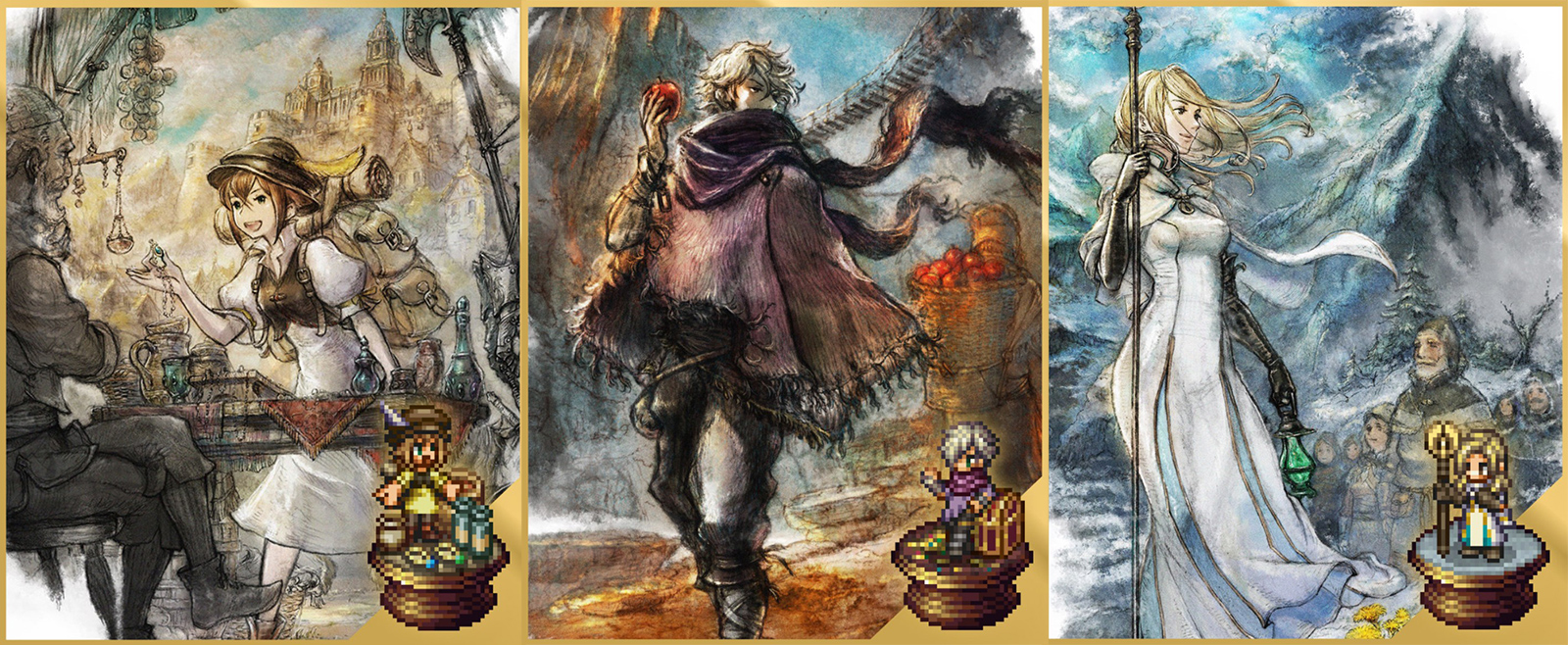 Nintendo, Square Enix That said, I wish the sprites were bigger. Octopath Traveler automatically adds a fairytale-esque vignette to the game (which you can turn off) but the characters and NPCs take up minimal space on the widescreen Switch. It's a waste. Even in battle, the 3D perspective makes the characters in the foreground bigger but shrinks the heroes in the back. Plus more tilt-shift. The same can be said for the lavish artwork: You'll only see glimpses of richer character design when you choose to continue a character's story at a tavern. Why not showcase this on the load screen, or even inside the menus? On the positive side, Octopath Traveler's eight-person cast makes for a relatively non-linear game. You can even choose not to pick up all of the travelers, hold off on progressing someone's story (separated into a handful of chapters with recommended character levels) to focus elsewhere or belt out several chapters in the same town, soaking up everything each locale has to offer. 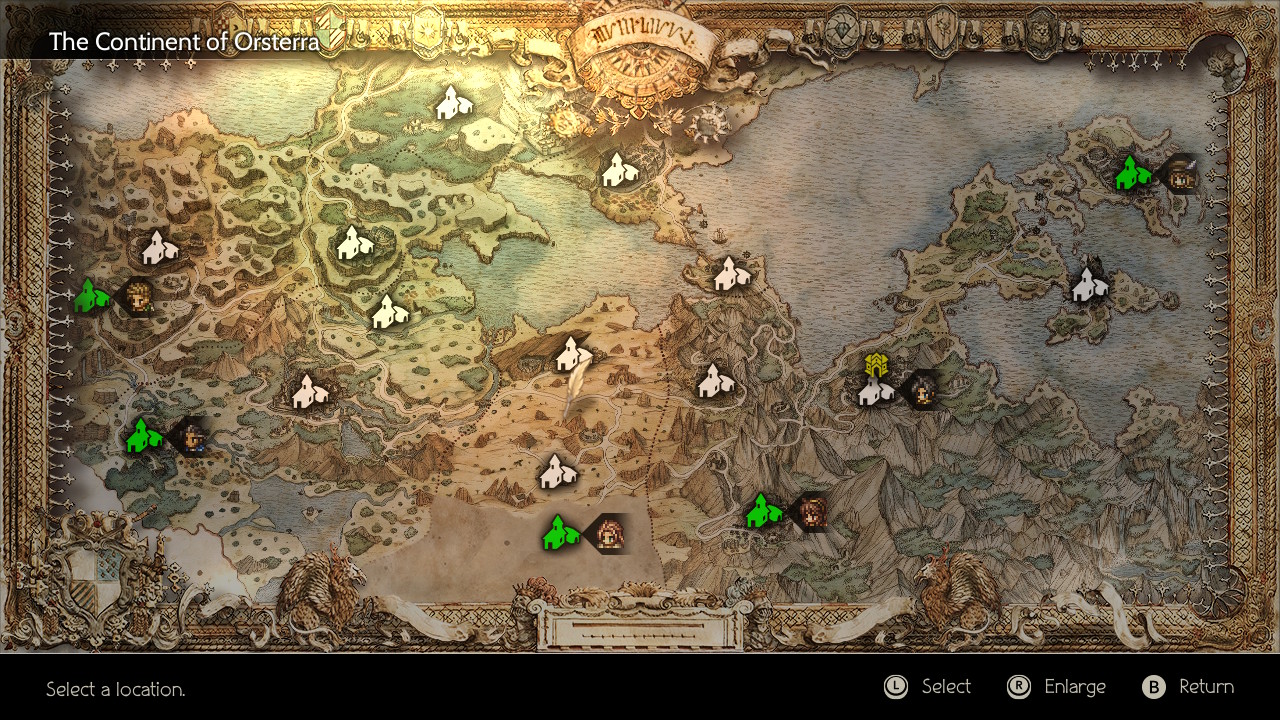 Nintendo, Square Enix The game takes you on a tour of snowy mountains, coastline villages, a town built around a gladiatorial colosseum and even university cities. This is all boosted by an orchestral score that differs from place to place and -- something I loved -- a battle theme that seems to level up as you do, increasing in epic scale as your characters toughen up. The audio, in general, is another way the game reminds the player that this isn't a game for your decades-old Nintendo. Alongside the soundtrack, key cut-scenes are voiced (with English and Japanese options), while more minor interactions still get a word or two, if not an audio exclamation, to help convey whatever the text is saying. The story unfurls one character at a time: You head towards cities (the world map shows where each character's chapter is), and once you enter, you can kick things off or simply explore. When a chapter starts, cut-scenes and story interactions feature only the leading character. While you do get to choose your main character at the start, barring the fact that they have to be in your party at all times, it doesn't make any difference to how the game or story progresses. Barring traveler banter (optional scenes between whoever's quest you're undertaking and someone else in the party), there are no other interactions between the eight leads. It's weird: These people are all fighting alongside each other but have nothing to say when families are reunited, revenge is wrought and... all those other RPG tropes. After 60 hours of playthrough, the stories, even in mid-game chapters, don't overlap or coincide. Non-playable characters bubble up when needed in the arc of one hero but aren't seen anywhere else. The world itself is epic, and it's not the usual torn-by-war, there-was-an-apocalypse setting -- though such things get a mention -- as each region deals with its own troubles and drama. Some places have zero crime, while others are rife with sketchy characters and trouble. 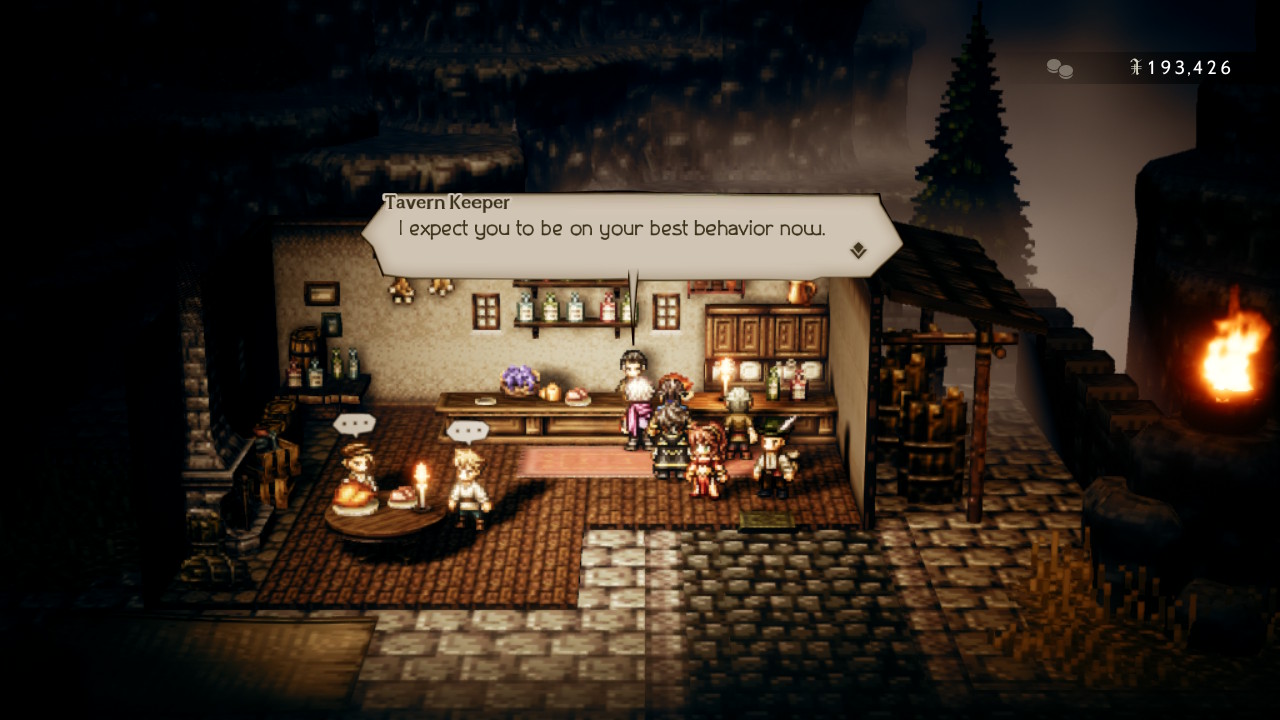 Some of the stories are engrossing, but it feels like eight game novellas set in the same world. You learn about each location through the characters' specialized field skills, whether it's stealing items, enquiring about hidden treasure, recruiting townsfolk as temporary fighters or just challenging them to a fight. But these conversations and mini-quests deal mostly in the micro, not the macro. It's an involving way of getting the player to interact with nearly everyone in a town -- better than just mashing the action button to talk. But despite all these interactions, there's nothing central to it all. Because each character pretty much exists independent of the others, it feels like the story hardly ever ramps up. I don't need a macguffin God of Chaos or some emperor to unite against, but after 60 hours, the game still lacks something to fight for. Some of the stories (no spoilers, but Primrose the dancer is a highlight) are engrossing, but it feels like eight game novellas set in the same world. It's different, sure, but I want my team to feel more like a team. 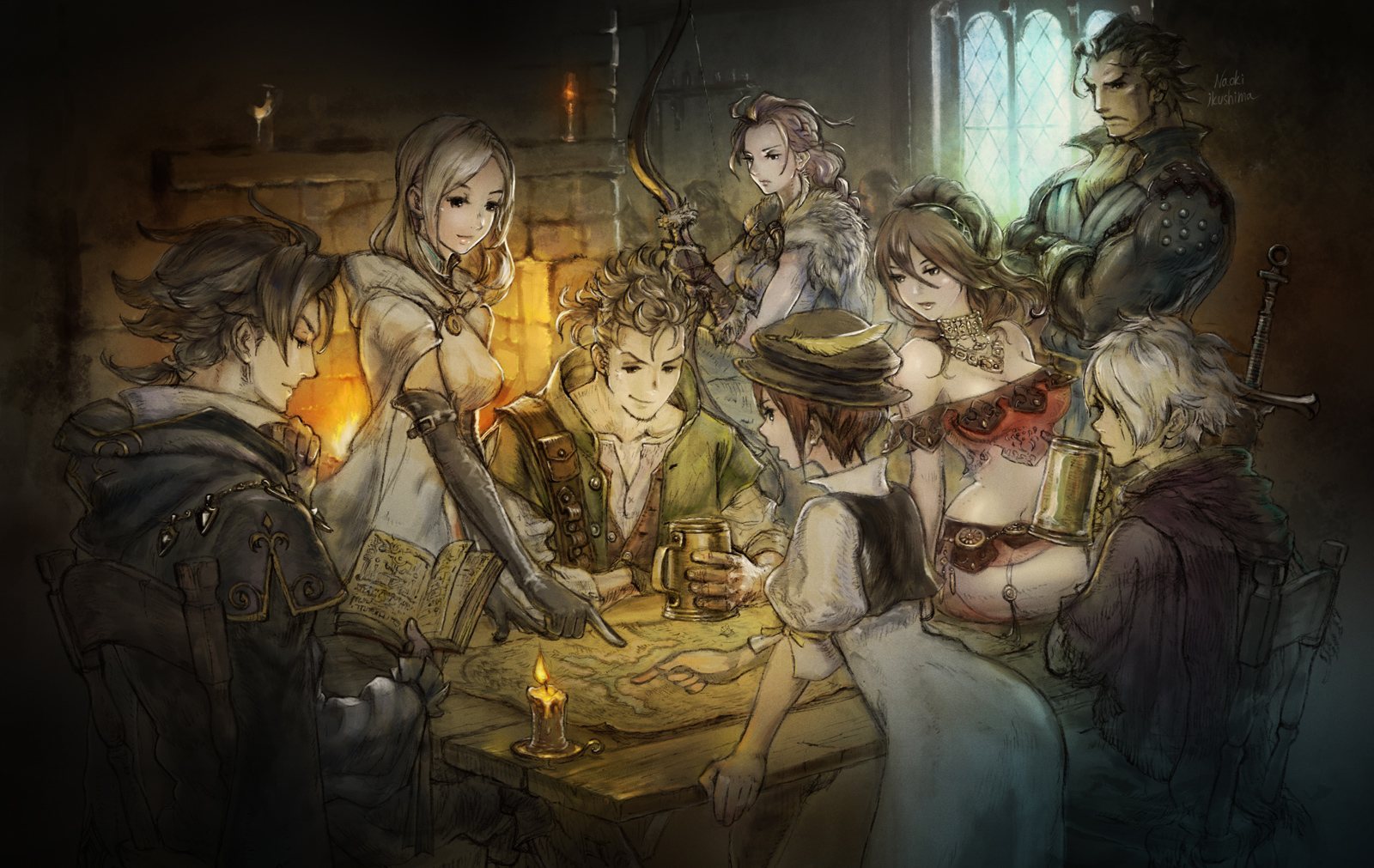
This never happened. The Switch now has an RPG many of us have been waiting for, and it's a tribute to Nintendo and Square Enix's golden age of role-playing games decades ago. It delivers in a lot of ways: I care about each character, the musical score is catchy, and I like the more mature themes raised in the story. It just lacks cohesion. Recent triple-A RPGs like Persona 5 and Final Fantasy XV have hinged on the drama of interpersonal relationships -- I miss that. Some (optional!) party banter can't substitute for that.
via Engadget RSS Feed https://ift.tt/2JfYcO9 |
Comments
Post a Comment